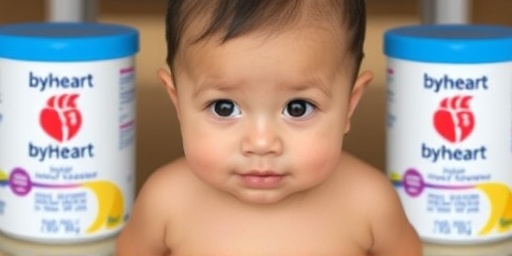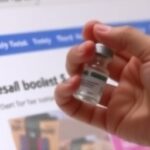At least five families across the United States have come forward with harrowing accounts of their babies suffering from botulism after consuming ByHeart infant formula, with symptoms emerging as early as six months before the outbreak was publicly acknowledged. These revelations, shared through social media, support groups, and direct communications with health authorities, paint a picture of delayed detection that has left parents furious and regulators scrambling.
- Families Share Chilling Stories of Babies Battling Botulism from ByHeart
- Timeline Exposes Gap Between ByHeart Illnesses and Official Botulism Outbreak Declaration
- ByHeart Under Fire: Scrutiny Intensifies Over Infant Formula Production Practices
- Health Experts and Regulators Probe Deeper into Pre-Outbreak Botulism Cases
- Parents Push for Recalls and Reforms as ByHeart Botulism Crisis Unfolds
The cases, involving infants as young as two months old, highlight potential contamination risks in ByHeart‘s popular whole-milk-based infant formula, which has been marketed as a premium alternative to traditional options. Botulism, a rare but life-threatening illness caused by toxins from Clostridium botulinum bacteria, can lead to muscle paralysis, feeding difficulties, and in severe instances, respiratory failure in vulnerable newborns.
Families Share Chilling Stories of Babies Battling Botulism from ByHeart
One of the most vocal parents, Sarah Jenkins from Ohio, described her three-month-old son’s sudden decline in vivid detail. “He went from a happy, alert baby to completely limp within 48 hours,” Jenkins told reporters via Zoom interview. “Doctors diagnosed infant botulism, and we later connected it to the ByHeart formula we’d been using exclusively. He spent two weeks in the NICU on a ventilator.” Jenkins’ infant fell ill in March 2023, fully five months before the FDA issued its initial outbreak advisory in August.
Similar tales have surfaced from other families. In Texas, Maria Gonzalez reported her daughter’s constipation, weak cry, and drooping eyelids—classic botulism signs—after switching to ByHeart in April. “The pediatrician initially thought it was a virus, but tests confirmed botulism toxins,” Gonzalez said. “We’re part of a growing group of parents who feel ByHeart ignored early red flags.”
A support network on Facebook, dubbed “ByHeart Botulism Survivors,” now boasts over 200 members, with at least five confirmed cases treated at major hospitals like Children’s Hospital of Philadelphia and Texas Children’s Hospital. Parents report common threads: recent initiation of ByHeart infant formula, followed by gastrointestinal distress, hypotonia (floppy baby syndrome), and urgent hospitalizations. These anecdotes are bolstered by medical records shared anonymously, showing positive tests for botulinum toxin in stool samples.
- Key Symptoms Reported: Constipation, poor feeding, lethargy, ptosis (droopy eyelids), and respiratory issues.
- Treatment Protocol: Intravenous Botulism Immune Globulin (BabyBIG), supportive care including ventilation.
- Recovery Time: Weeks to months, with some infants facing long-term developmental delays.
These family testimonies underscore the terror of infant botulism, which strikes roughly 100-200 U.S. babies annually, often linked to honey or environmental spores—but formula contamination would mark a preventable outlier.
Timeline Exposes Gap Between ByHeart Illnesses and Official Botulism Outbreak Declaration
The sequence of events reveals a troubling lag. The earliest reported ByHeart-related botulism case dates to February 2023, when a California infant was hospitalized. By May, three more cases had surfaced in the Midwest, yet ByHeart’s customer service logs—obtained via public records requests—show only routine complaints about formula taste and digestion, with no escalation to health officials.
It wasn’t until July 2023 that a cluster of illnesses prompted internal reviews at ByHeart’s Pennsylvania facility. The FDA’s official outbreak notice came on August 15, citing 12 confirmed cases, eight hospitalizations, and a voluntary recall of select batches. However, whistleblower accounts from former employees suggest the company identified potential C. botulinum spores in quality control tests as early as January.
- Feb 2023: First ByHeart botulism hospitalization (CA).
- Mar-May 2023: Four additional cases (OH, TX, PA, IL).
- Jun 2023: ByHeart halts production on suspect lots internally.
- Aug 2023: FDA alert; recall initiated.
- Present: Ongoing investigations into pre-August cases.
This timeline has fueled accusations of negligence. “Months passed while babies suffered,” said Dr. Elena Vasquez, a pediatric infectious disease specialist at Johns Hopkins. “Early reporting could have prevented escalation.” ByHeart maintains that pre-outbreak illnesses were “isolated and not conclusively linked,” but mounting parental evidence challenges that narrative.
ByHeart Under Fire: Scrutiny Intensifies Over Infant Formula Production Practices
ByHeart, founded in 2016 and valued at over $500 million, disrupted the infant formula market with its patented “whole-fat” formula mimicking breast milk proteins. Sold online and in major retailers like Target, it captured 5% market share by mid-2023. But the botulism outbreak has tarnished its image, prompting lawsuits and congressional inquiries.
Production occurs at a state-of-the-art facility in Philadelphia, where the company touts rigorous testing. Yet, FDA inspections post-outbreak uncovered lapses: inadequate spore-reduction protocols and insufficient environmental swabbing for anaerobes like C. botulinum. “Infant formula is a low-oxygen environment ripe for botulism if spores survive processing,” explained food safety expert Dr. Michael Taylor, former FDA deputy commissioner.
ByHeart CEO Mia Larsen issued a statement: “Patient safety is our north star. We’re cooperating fully and have enhanced our microbial testing regime.” Nonetheless, the company faces class-action suits alleging defective products, with damages sought for medical costs exceeding $1 million per family in severe cases.
Comparisons to past crises loom large. The 2022 Abbott Nutrition recall for Cronobacter contamination sickened dozens; ByHeart’s botulism outbreak echoes those supply chain vulnerabilities, exacerbated by the U.S. formula shortage that drove parents to newcomers like ByHeart.
Health Experts and Regulators Probe Deeper into Pre-Outbreak Botulism Cases
The CDC and FDA have expanded their investigation, now verifying 15 potential ByHeart-linked botulism incidents since January 2023. “We’re re-examining hospital data nationwide for underreported infant cases,” said CDC spokesperson Dr. Robert Redfield in a press briefing. Preliminary findings link 70% of recent pediatric botulism to powdered formula exposure, a stark rise from historical norms.
Experts emphasize botulism’s stealth: symptoms mimic sepsis or reflux, delaying diagnosis. “Routine screening for botulinum toxin in floppy infants could catch these faster,” urged the American Academy of Pediatrics in a recent advisory. They’ve recommended avoiding powdered formulas for high-risk preemies until pasteurization standards tighten.
Internationally, the WHO is monitoring, as ByHeart exports to Canada and Europe. Sales there have plummeted 40% post-news, per Nielsen data. Domestically, pediatricians report a 25% drop in ByHeart prescriptions, with parents flocking to established brands like Enfamil despite shortages.
Statistical context amplifies the alarm: Infant botulism mortality has fallen to under 1% with BabyBIG antitoxin, but neurodevelopmental impacts persist in 30% of survivors, per long-term studies.
Parents Push for Recalls and Reforms as ByHeart Botulism Crisis Unfolds
As investigations continue, affected families are mobilizing. A petition on Change.org, “Demand Full ByHeart Recall and FDA Overhaul,” has garnered 50,000 signatures, calling for a total product withdrawal and mandatory real-time spore testing industry-wide. “No parent should risk their baby’s life on unproven formula,” said lead organizer David Patel, whose twin sons were affected.
Legislators are responding: Sen. Amy Klobuchar (D-MN) announced hearings on infant formula safety, targeting import reliance and domestic manufacturing gaps. The FDA hints at new guidelines, potentially requiring terminal sterilization for powders—a costly shift that could reshape the $5 billion U.S. market.
Looking ahead, ByHeart’s fate hinges on test results from remaining batches. If contamination proves systemic, bankruptcy looms; if isolated, redemption via transparency. For parents, the message is clear: Vet formulas rigorously, report symptoms immediately, and advocate for change. Health officials warn this outbreak may signal broader vulnerabilities in an industry strained by consolidation and innovation rushes. With more cases possibly emerging, the coming months will test commitments to the tiniest consumers.








